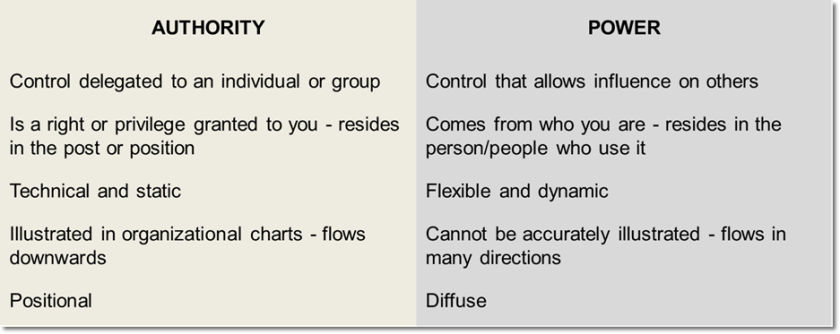“Power does not consist in striking with force or with frequency, but in striking true.”
– Honoré de Balzac
There are those who say that you can’t have authority without power. There are also those who say that you can’t have power without authority. Either way, it is inescapable to lead change without some understanding of these concepts. To me, the critical question is: Can people with authority cultivate a culture that people feel empowered to lead innovation?
 Authority is not always blindly obeyed. Authority is subjective; it is depends upon an our perception of its rightness. When you’re trying to lead people to create change, power is more important than authority. Leaders should embrace the idea of people feeling powerful.
Authority is not always blindly obeyed. Authority is subjective; it is depends upon an our perception of its rightness. When you’re trying to lead people to create change, power is more important than authority. Leaders should embrace the idea of people feeling powerful.
Talking About Power
Leaders think of power as ability to do or accomplish something. What is POWER? In mathematics, power refers to exponentiation. It can also mean exponential growth of the number of people on board with the change you’re trying to create.
In physics, power refers to energy, force or momentum. An action in one place can make something happen in another place. Social power is the same way. Think of any movement, and how actions in one place influenced results in other places.
I like to remind folks about these myths and insights about power from a great book, The Quickening of America:Building Our Nation, Remaking Our Lives by Frances Moore Lappé and Paul DuBois
Myth: There’s Only So Much Power to Go Around
The Empowering Insight: Relational power expands possibilities for many people at once. The more you use it, the more there is.
Myth: Power is a One-Way Force
The Empowering Insight: Power always exists in relationships, going both ways. In relationships, the actions of each affect the other, so no one is ever completely powerless.
Myth: Power is a Dirty Word
The Empowering Insight: We cannot realize our values or goals without power. Power is the capacity to act publicly and effectively, to bring about positive change.
How do you think about power?
Three Faces of Power [added 1/21/2015]
When people think about political power, they usually fall into two groups. The first sees power as an elitist concept, one where a privileged few call the shots. The other group has a pluralist view of power – that it is distributed equitably in society. This is, of course, a basic tenet of democracy. It is also critical to the idea of organizing, and leading change.
Without getting too academic, I want to introduce just a little theoretical stuff that might help expand our practical notions of power. Political Science scholars have, for the last half century studied what are called the faces of power. Here are just three brief snapshots from this ever-expanding continuum of thought.
1) Robert Dahl’s One-Dimensional Model of Power, which says that power is exercised only in decision-making situations where parties hold opposing views. That power is exercised thusly: A has power over B, and A can get B to do something that B would not otherwise do;
2) Peter Bachrach and Morton Baratz’s Two-Dimensional Model of Power, this says that in addition to this decision-making function, power is also related to the control of communication. Messaging, or silencing messages, can control the political process, and restrict it to issues that serve only to reinforce power.
3) Steven Lukes’ Three-Dimensional Model of Power says that the first dimension of power is success in decision making. The second dimension is managing the agenda. According to Lukes, the third face of power is not as overt as the first two. It is the manipulation of the wishes of others without them knowing they are being manipulated.
In an age of rapid dissemination of information it is easy to see how the second face (controlling communication) is more difficult. People acting as citizen journalists take to the streets from multiple angles to expose truths that people seeking power and control don’t want you to know. When everyone on the street has a camera and a publishing mechanism in their pocket, it is pretty hard to deny the reality they are sharing.
Similarly, manipulation is enhanced by social media. For people who want to maintain power, propaganda finds all media platforms. For example, Fox News masquerades as “fair and balanced” journalism when it has a clear agenda that has no intention of being either fair, nor balanced.
People’s access to good information is important for leadership. Leadership is not about public relations machines that spin every message your way. Real information creates real options, and real choices. When people have the power to make informed choices, they are more likely to act on behalf of that choice becoming a reality.

Don’t forget negative power–a la Bachrach and Baratz.
LikeLike
Hi there! This is my first visit to your blog!
We are a team of volunteers and starting a new initiative in a community in the same niche.
Your blog provided us beneficial information to work on.
You have done a wonderful job!
LikeLike